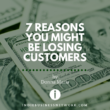How One Indie is Taming the Global Shea Butter Trade, One Nut at a Time
Yesterday, I posted about how blogging on a schedule can help you keep blogging quick and painless. I suggested doing an "interview post" on Mondays. Never one to ask you to do something I wouldn't do myself, I'm going to test drive my suggestions to see how they work for me. Here's my interview post, with Adam Chapman, owner of Savannah Black.

We've all heard the saying, "Do well by doing good." To me, it's another way of expressing what my mother always said: "Do unto others as you would have them do unto you." In other words, what goes around comes around. Adam Chapman is one Indie Business owner who is makes all of those phrases come alive through his business, Savannah Black, which imports shea butter products from Africa.
A former Peace Corps volunteer in West Africa, Adam started his business after discovering the benefits of shea butter. While in Africa, he also discovered that, while the world enjoys the benefits of shea butter, the women who produce it in the African countryside are not benefiting financially from their labor. I asked Adam to tell me little about how his business is changing that.
dM: What makes shea butter special?
Adam: In addition to its remarkable skin healing properties, just the history of shea butter in West Africa in and of itself is pretty special. Its production has been passed down from mother to daughter, from sister to sister, from Queens to royal servants for literally thousands of years.
It literally takes an entire village of women to produce shea butter in quantities sufficient to satisfy the rest of the world. Four tons of shea nuts are needed to make just 1 ton of shea butter, and every ounce of those tons is produced by hand through the sweat of women.
dM: How has the market for shea butter evolved?
Adam: Shea butter is relatively new on the world market. It's produced in a wide swath of Savannah lands from Cameroon and Senegal, to Ghana to Nigeria all the way up to Mali and Niger. It's unique because even though it’s a fast growing export commodity, unlike other commodities, foreign investment is not needed to maintain its production.
Ghana alone exports about 20,000 tons of shea butter a year. In addition to skin care, it's also used as a cooking oil. It came on to the international market in the early 1900’s, but really took off in the 1980’s when a pound of raw shea butter commanded upwards of $50US. Its recent emergence as the ingredient of choice for luxury beauty goods has to be attributed to the increased involvement of westerners in West Africa, and the demand of Americans and Europeans to replace chemical-laden cosmetics with natural alternatives.
dM: How has the international shea trade affected African women who produce the shea?
Adam: Ahhh, the million dollar question. This is one of the reasons I am in business.
A primary principal of business is that everyone in the supply chain has to make money. If one person in a supply chain of 10 is not making money, soon no one will be making money.
The international shea trade has given African women more work, but it's just more work the women don’t need. They already work like mad. You should see how they work before you ever complain about being tired after a long day at the office.
In theory, the more you pay for an item, the more the worker's get right? The union theory. Well, in Ghana and many other male dominated African societies, the women who work with shea receive a mere pittance for the butter they process. But they do the work anyway because they are uneducated and living in rural areas with children to feed.
Some money is better than no money to them.
dM: So how do you help?
Adam: I don't just import shea butter and sell it. A few times a year, I go directly to the homes and villages of the women who produce the shea butter I sell. I teach them to work smarter, not harder. This is a foreign concept to many of them.
For example, they used to pack the shea in bulky plastic bags that don't lend themselves well to international trade. After a few meetings, I finally convinced them to pack the butter into into plastic containers of various frequently ordered sizes.
I also pass along their need for various supplies to my customers, and I donate a percentage of my profits to help them purchase things they need. For example, their current need is for money to buy more pots to make the shea butter in, new head pans and other hardware. I am currently donating money from every sale of 25 pounds or more of shea butter toward this need.
Here's something else. When you pay between $8 and $40 for 4 ounces of shea butter at a cosmetics counter, you are putting money straight into the supply chains' pockets, leaving next to nothing for the African women. Oh, sure, they say they pay them a "fair" salary, but to me, it's simply unfair NOT to pay them on a per unit basis when that's how you make money selling it.
I pay per kilo produced, which is more fair. For example, say a woman has to look after her kids and family, and only has an hour or two to work per day. I pay her for the units she produces. Others don't. The women I buy my shea butter from are therefore better off than they were before I started buying their shea butter. I won’t claim to have stopped the male dominated society, the domestic abuse, the ridicule or the semi-forced labor, nor will I claim to be outwardly protesting or marching for their rights.
But I am doing something positive. I'm giving them a chance to make something more of themselves, a chance at making a respectable living and increased self esteem. And what's more, it's helping them pass this legacy along to their daughters.
Update: 2/6/09: Savannah Black is now out of business (but this is still a great story!) To search for and find other shea butter suppliers, visit Mango Butter.com and enter "shea butter" into the search window.
What do you think?
I love Adam's story. I love how he is not trying to save the world from evil, but is simply doing his part to make a positive change and create a win/win situation for himself, his customers and the brave, beautiful women of Africa who make it all possible. Thanks, Adam, for reminding us that we all can and should do something.
If you've enjoyed this post, you may wish to learn more about Adam's business in my Indie Experience Newsletter.
You may also wish to subscribe to my blog feed to receive more great Indie Stories to inspire and encourage you.
More Indie Stories
I Won Best In Show!
Flowers and Fusion
Little Hat, Big Cattle
Jacci Thompson-Dodd, author



